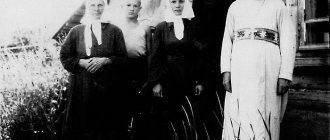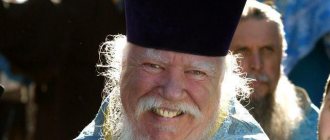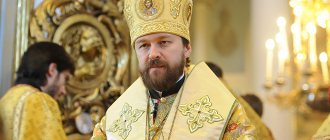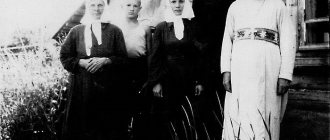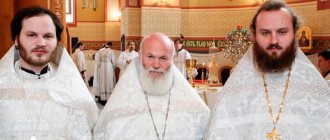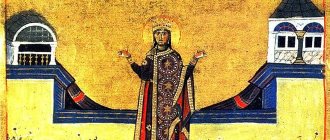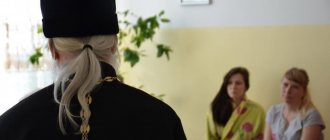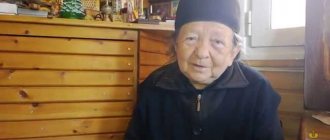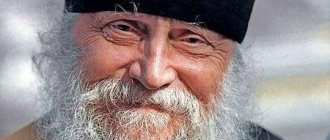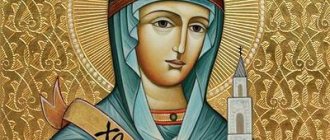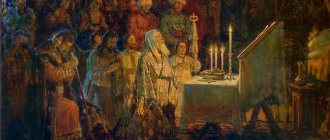Osipov Alexey Ilyich is a leading expert in the field of theology, professor and teacher at the Moscow Theological Academy. Osipov's lectures, conversations and sermons are distinguished by subtle humor, accessible presentation and deep knowledge of the subject of discussion. He celebrated his 80th birthday in March 2022.
Parents, childhood, studies
Alexey Ilyich was born in the city of Belyov, Tula region, on March 31, 1938 . His parents were simple employees. Until the age of 14, he lived in Kozelsk and the village of Optino , after which the family moved to the city of Gzhatsk located in the Smolensk region.
A great influence on Osipov's worldview in his childhood and youth was the Orthodox priest and writer Abbot Nikon , who was rector until 1948 in the churches of Kozelsk and Belyov, and then in Smolensk.
After graduating from high school, Alexey chose the path of a theologian , but did not immediately enter a higher educational institution and for three years at home, he studied the beginnings and foundations of theology under the guidance of Abbot Nikon .
With Abbot Nikon
At the age of 20, Osipov, having received a letter of recommendation , immediately entered the last (fourth) year of the Moscow Theological Seminary, having passed exams for the previous academic years.
In young age
Essays
Published in the “Journal of the Moscow Patriarchate” (JMP), in “Theological Works”, “Stimme der Ortodoxie” (publishing house of the Moscow Patriarchate), in secular magazines and newspapers, as well as abroad: in Germany, Finland, Greece, the USA, Italy and other countries.
- Translation of the rites of Matins and Vespers according to the 1951 edition of the service book of the Greek Church in comparison with the Russian service book of the Synodal edition. (Manuscript. MPDA Library.)
- Basic theology. A course of lectures for students of the Moscow Theological Seminary. Moscow.1994.
- The path of reason in search of truth. M. “Danilovsky evangelist”. 1997; "Brotherhood in the name of St. Alexander Nevsky. 1999; M. "Sretensky monastery". 2002, 2003, 2004; M. "Good." 2003; St. Petersburg "Satis." 2007.
- Orthodox understanding of the meaning of life. Kyiv. 2001.
- The afterlife of the soul. "Danilovsky evangelist". 2005; 4th ed.: M. 2007.
- Hegumen Nikon (Vorobiev). Letters on spiritual life. Sretensky monastery. 2005.
- Afterlife. M. "Gift". M. 2006.
- Bearers of the spirit of St. Ignatius (Brianchaninov). M. 2007.
From published articles, reports:
- Justice and violence. Theological works. No. 11.M. 1973.
- Violence and justice. ZhMP.1973. No. 5.
- Salvation is liberation for peace and justice in Christ. The meaning of the Church. ZhMP.1976.No.3.
- On some principles of the Orthodox understanding of ecumenism. Theological works. No. 18. M. 1978.
- Thirtieth anniversary of the World Council of Churches. JMP. 1978. No. 12. - 1979. No. 1.
Works on the Internet
Lyrics
- Books and publications on the official website
- Online selection of articles and interviews
Audio and video
- Official site
Life path
- Moscow Theological Academy in 1959 , from which he graduated in 1963, receiving a candidate's degree in theology, for his work comparing the Greek and Russian religious systems.
- After graduating from the academy's postgraduate course in 1964, Osipov began teaching at the same educational institution on ecumenism (the ideology of pan-Christian unity).
- In 1965, Alexei Ilyich was invited to teach a course of lectures on theology at the Theological Academy and Seminary in Moscow, and after some time to teach a number of disciplines in graduate school.
- In the 1960s, in addition to teaching, the theologian was active in public life and engaged in journalism ; he participated in the preparation of material for the religious and ethical encyclopedia, and was also a member of the editorial board of the almanac “Theological Works.”
- From the very beginning of his teaching career, Osipov was distinguished by his ability to clearly and clearly present educational material , and, if necessary, express criticism about certain aspects of church life and history.
- Since 1966, Alexey Ilyich, in addition to teaching the discipline “Basic Theology,” taught a number of other disciplines at the seminary. In 1969, he received the title of associate professor , and in 1975, professor .
- From 1973 to 1986, the theologian was a member of the educational committee of the Holy Synod (the governing body of the Russian Orthodox Church), which coordinated and directed the work of church schools.
- For eight years, starting in 1976, he worked on the Commission for Christian Unity . In 1985, for a number of scientific works, Osipov received a doctorate in theology.
- As a co-chairman since 1991, Alexey Ilyich participated in the preparation and work of the interethnic conference “Science, Religion, Philosophy” held every year until 2016 in the city of Dubna.
- In the 90s, he was a member of the presidium of the public organization "Russian People's Council" , and worked on the committee for coordination between the Russian Orthodox Church and the Russian Armed Forces. Participated in the development of a document outlining the attitude of the Russian Church to issues of interreligious relations.
- Osipov is among the ministers of the Russian Orthodox Church who conduct dialogues with the Catholic, Lutheran, Anglican and Episcopal churches, and is also a member of the Orthodoxy - Islam .
- The professor is constantly active in educational activities , giving lectures and reports on television and radio, at universities and institutes, in schools and cultural centers, etc., as well as at international assemblies.
- Alexey Ilyich publishes his works in the following publications: “Russian Journal”, “Theological Works”, “Rossiyskaya Gazeta”, “Literary Gazette” and others.
- After 2010, Osipov wrote a number of articles entitled “Why does a person live?” , “How to live today?” , “God” and others, in which he spoke about the need for religious sermons and education in modern life.
- In 2013, he participated in the documentary film “Virgin. Earthly path."
- In 2022, he took part in the documentary film “Memories of Abbot Nikon Vorobyov.”
- Since 2022, he began hosting the TV show “Search for Truth with Alexei Osipov” on the Spas channel.
- Since 2022, he has been hosting the program “Professor Osipov” on the same channel “Spas”.
Alexey Osipov
Criticism
Opponents of Prof. Osipov found in his statements views that, in their opinion, seriously contradicted church teaching; the degree of criticism sometimes reached the point of accusations of heresy. In 2013, a letter was sent to the Patriarch of Moscow and All Rus' Kirill from a group of believers (48 signatures) headed by the head of the Orthodox Missionary School at the Synodal Missionary Department A. V. Lyulka [1], in which the authors asked for clarification regarding whether they correspond whether the opinions of A.I. Osipov's "accurate exposition of the Orthodox faith." The professor's wrongness was expressed by the authors of the letter in the following five points:
- Denial by Osipov A.I. eternity (infinity) of Gehenna torment.
- In some lectures Osipov A.I. directly states that Christ accepted original sin, teaches that the Lord accepted and healed the original sinfulness “in Himself” through gradual correction.
- Osipov A.I. declares the dogma of the Atonement to be borrowed from Roman Catholicism, allegedly alien to Orthodox dogma and the teaching of the fathers.
- Speaking about the Sacrament of the Eucharist, Professor Osipov A.I. teaches that in the Sacrament it is not the true transubstantiation of bread and wine into the Body and Blood of the Savior, but the “hypostasis” (“in Chalcedonian”) of bread and wine into the Hypostasis of God the Word, that is, believers partake not of the true Body and Blood, but of the bread itself and wine.
- Denial of the need for infant baptism, denial in general of the need for the Sacrament of Baptism for salvation.
In 2016, the authors of the letter received the Conclusion of the Synodal Biblical-Theological Commission signed by its secretary A. A. Shishkov [2] on all five points, the essence of which boils down to the following:
- The opinion about the finality of hellish torment and the theological views associated with it have no basis in the Holy Scriptures
- The New Testament repeatedly emphasizes the complete non-involvement of the incarnate Son of God with any sin.
- Orthodox theology, without accepting the extremes of the legal theory of the Atonement, has always recognized the dogma of the Atonement as one of the fundamental foundations of the Christian doctrine of salvation.
- Not a single Local Church, not a single Church Council, has rejected the term “transubstantiation” or condemned it as unorthodox. As for the theory of Professor A.I. Osipov, it is a theological innovation based on the views of Archpriest Sergius Bulgakov.
- The practice of infant baptism is mentioned in early Christian sources. There is no clear answer in the Orthodox tradition to the question about the final fate of unbaptized infants.
The letter concluded as follows:
“The Synodal Biblical Theological Commission respectfully notes the significant positive merits of the professor of the Moscow Theological Academy Alexei Ilyich Osipov in the preaching of Orthodoxy over many years of his work for the benefit of the Russian Orthodox Church.
At the same time, the commission draws the distinguished professor’s attention to the need for a more balanced coverage of the above topics. An Orthodox theologian must strive to set forth, first of all, “what has always been believed, everywhere and by everyone” (St. Vincent of Lerins), and if there are different approaches in the patristic tradition, he should illuminate them, if possible, evenly, without giving clear preference to one particular point of view .
Alexey Ilyich did not agree with the “Conclusion”; in his response, he pointed out that his statements were partly distorted by the accusers, or taken out of context, and expressed regret that the Commission did not take into account his arguments and the patristic sayings he cited. With the answer of Professor A.I. Osipov to the “Conclusion” and the reaction of his opponents to this answer can be found on the page “Correspondence polemics regarding the conclusion of the SBBC on the theological views of Prof. Osipov" of the Internet resource "ABC of Faith" -
Certain theological views
- Discussing the image of God, Osipov points out its significant difference for different religions, since in this case this idea is characteristic of a given religion, and it is not the One invisible God that everyone talks and thinks about.
- Alexey Ilyich, touching on issues relating to spiritual mentors and prophets , warns believers against blindly following their guidelines, urging them not to recklessly accept them on faith without consideration and testing.
- Speaking about environmental problems , the professor argues that they relate, first of all, to the spiritual sphere of man , since the state of the environment directly depends on the actions of people in relation to nature.
- The theologian, noting the growing trend of indifference among Orthodox believers to moral and dogmatic teaching, expresses fears about the transformation of the Church into a community of people moving away from the truth. It is in the correct understanding of the foundations of the Orthodox faith and the spiritual enlightenment of the people that the professor sees the source of its preservation.
- Alexey Ilyich, speaking about prayer, claims that if a person does not have prayer inside, and he does not pray with either his mind or soul, then his “religiosity” is imaginary and empty .
Alexey Ilyich Osipov
“...Atheist and your friend Alexander Osipov”
The SOUL of man is darkness. This old expression comes into play whenever we turn to the study of the life and fate of an extraordinary person. Of course, our hero can evoke various feelings - from admiration to sharp rejection. However, this is not the main point. The main thing is to understand the motivation of his actions, to understand the motivating reasons that forced him to do what he ultimately did. Once, the famous statesman of the last reign, Sergei Witte, noted that to define a person it is necessary to write the novel of his life, “and therefore any definition of a person is only strokes that, to a remote extent, determine his figure.” The novel of life, or more precisely, the drama of life, is always assessed subjectively. Is it possible otherwise? Apparently not. History is not free from ethical principles, and if so, then we have no opportunity to refuse a “biased” summary.
On Sunday morning, December 6, 1959, opening the central party newspaper Pravda on page four, the Soviet reader could read the catchy headline of a huge (half a newspaper page) article: “Rejection of religion is the only correct path” and the subtitle: “Letter to the editor . Alexander Osipov." It followed from the letter that the famous Orthodox theologian, former archpriest and master of theology, professor of Leningrad theological schools, who at one time was their inspector, had broken with religion. What could make this man publicly decide to take such a step, to break with his past? Actually, the article was devoted to answering this question. Its author tried to assure readers that the historical-critical study of the Bible, the history of religions, observation of the development of natural sciences and “practical acquaintance with all the abomination of the capitalist world and the sometimes pathetic, sometimes vile role that it plays” helped him break “with the world of illusions.” there is religion,” as well as Marxism-Leninism and Soviet reality.
The declarative nature of such a statement was so frank that it immediately caught the eye of an unbiased reader. But the publishers' calculations were obviously not based on convincing skeptics. It was clear that the purpose of the article was ideological and propaganda. The declaration is the best proof for the builders of the “new world”, where religion had no place.
But there was one more point: the renunciant was indeed a bright personality, possessing an undoubted literary talent. And the letter to the newspaper showed this. In it, Osipov told how his atheism gradually grew and became stronger, how he came to the conclusion that he could come to terms with his conscience (!) and call himself an honest person only by breaking with religion.
The renunciation caused the widest resonance: regular anti-religious activists started talking about Osipov in a way they had never talked about any of the renunciants before. TV programs were filmed about him, radio appearances were prepared, and they were written about in brochures and newspapers. In a few weeks, Osipov gained all-Union fame and became a real celebrity. What caused such fame? After all, even before him they “loudly” renounced (for example, the young teacher of the Saratov Theological Seminary Evgeniy Duluman). In addition, it is known that during the years of Khrushchev’s persecution of the Russian Orthodox Church, about 200 clergy renounced religion. Why such attention to Osipov?
Apparently because he was the brightest among all the renegades, whose name was not only known, but also loved in church circles, especially by LDAiS students. Being a teacher by vocation, he treated his students with amazing attention and care, in difficult cases selflessly helping some of them out not only with advice, but also with money. His lectures, brilliant in form, were never missed by listeners, and his sermons delivered in the second half of the 1940s. in the academic church, earned Osipov the fame of the local “Chrysostom”.
So what actually happened on December 6, 1959, and why did a beloved teacher and theologian end up in the camp of persecutors of faith, taking on the responsibilities of a full-time atheist lecturer and popularizer of anti-religious knowledge? In order to find the answer to the question posed, let us turn to the main points of his biography.
Alexander Alexandrovich Osipov was born on November 10, 1911 in Revel (Tallinn) in the family of an official of a local branch of a state bank. Later, my father was transferred to work in Sukhumi, then to Orenburg. There the family met the revolution. The Civil War made its own adjustments: in order to survive in conditions of hunger and devastation, the Osipovs moved to their father’s homeland - Ivanovo-Voznesensk. There the family broke up, and the mother, taking the child, returned back to Tallinn in 1922. Thus, little Sasha came from the Soviet country to bourgeois Estonia. Life in Estonia at that time could not be called simple, but working as a proofreader in a printing house allowed Klavdia Grigorievna (that was the name of Osipov’s mother) to at least support her family. Alexander managed to graduate from Russian primary school and the Tallinn Russian private gymnasium, and brilliantly learn the Estonian language. The formal list, of course, cannot give an idea of how his appearance was formed in those years, what (and how) influenced his character. It is difficult to believe his “atheistic story” - it was written to order; It’s pointless to speculate on your own. However, we still have the possibility of retrospection.
Shortly before his death in the hospital, Osipov decided to dictate his memories. Among other things, he remembered and talked about the character of his mother, about how she influenced his life. These memories are a complete reproach, accusing the mother of unjustified harshness. Against this background, Osipov describes with undisguised warmth his relationship with his grandmother, his mother’s mother. What does he remember? It would seem that these are completely insignificant episodes. A simple, illiterate woman was the only person who warmed young Alexander with the warmth of her heart and lived his life. Loneliness and longing for simple human affection are the main leitmotif of his memories of childhood and youth. The moral discomfort and some kind of inferiority experienced in childhood could not help but affect him in the future. A hidden resentment towards the mother, who sought to bring her son “into the public eye,” but at the same time had little interest in his inner world, ran like a “red thread” through Osipov’s entire life. Based on this, it would not be an exaggeration to assume that it was in his family that he learned to value human communication most of all. But, apparently, he also learned insincerity and hypocrisy there: not having filial feelings for his mother, he nevertheless hid it throughout his life. Alexander Osipov's relationship with his mother is a striking example of his weak character.
The next stage in the biography of our “hero” is studying at the Orthodox department of the Faculty of Theology of the University of Tartu. From January 1931 to June 1935, he studied theological sciences, being an excellent student in almost all subjects. Before joining, he served a short period of military service in the Estonian army. The young scientist’s scientific career then developed quite successfully: after writing the work “The Pastorological Views of John Chrysostom,” Alexander Osipov received a master’s degree in theology and was left at the university as a doctoral student. He studied for a year and a half and was forced to leave the university (as a Russian) when a coup took place in Estonia and nationalists came to power.
However, the interrupted academic career did not in any way affect his fate as an Orthodox figure. On August 25, 1935, he accepted the deacon’s ordination, and five days later, the priest’s ordination. Earlier - on July 28, 1935 - he married the daughter of the Tallinn archpriest Nina Nikolaevna Pavskaya. As a priest, Osipov continued the activities he had begun during his studies: he worked as a missionary for prisons, almshouses, barracks, and insane asylums. He began his priestly service at the end of 1936 in the church in honor of the Kazan Icon of the Nativity of the Virgin Mary. At the same time, he taught at the Tallinn Russian private gymnasium, the Estonian private gymnasium Lender and at Russian evening theological courses.
In 1940, after the “reunification” of Estonia with the USSR, Osipov added secretarial duties to his previous duties, agreeing to work in the Estonian Exarchate of the Moscow Patriarchate. In the summer of 1941, he was mobilized into the Red Army, but was sent not to the front line, but to the rear. He served, however, not for long: already in 1942, Father Alexander was seen by the believers of Perm. There in Perm in 1943 he adopted a boy (“from war orphans”).
In 1944, when Tallinn again became Soviet, he got the opportunity to move to Estonia. As before the war, Osipov is the rector and secretary of the diocesan administration. Returning home, he did not meet his wife: she, taking her small children - a five-year-old daughter and a three-year-old son - went to the West along with the retreating German troops.
Thus, Osipov immediately and forever lost his family. As an Orthodox priest, he could not hope to ever create a new one; as a Soviet citizen, he did not even dare to dream of reunification with the old one, which, together with the enemy, was beyond the reach of the communist regime. Subsequently, Osipov received a message that his wife, having remained in the West, had disowned him as a “red priest.” This was one of the most powerful shocks of his life, to which, in those conditions, could not but be added fear for his future fate: what consequences of “his wife’s escape” could have taken place in the fate of a priest, who, moreover, grew up and was educated in a bourgeois country, quite clear. Moreover, in the pre-Soviet period Osipov himself was not too happy about life in the Soviet Union - among his 65 Estonian publications one could find openly anti-Soviet ones. It seems that it would not be too much of a stretch to assume that the competent authorities had their own information on this matter: you can’t hide an awl in a bag. I will take the liberty of saying that it was then that Osipov was recruited as a full-time informant and secret informant. The recently published report of Osipov to the Leningrad Commissioner of the Council for the Affairs of the Russian Orthodox Church Kushnarev, dated June 1951, only illustrates what has been said...
Subsequently, his church career turned out to be connected with Leningrad: the theological schools revived after the Patriotic War needed teachers, and Professor Osipov turned out to be just in time. Moreover, he was appointed inspector of LDAiS. In 1947, he even served as rector for some time. Life was thus determined. But then another event happened that played the role of the last, fatal straw, which, according to the Arab proverb, breaks the camel’s hump.
In January 1951, Osipov married for the second time his former spiritual daughter, who came from Tallinn to Leningrad to enter medical school. After his second marriage, Alexander Osipov finally stopped serving. It is no coincidence that, discussing his sad fate, one of his students, now a venerable St. Petersburg priest, said that “a cleric who stops serving the liturgy gradually degrades morally. The fact that Osipov, after his second marriage, never again performed the Sacrament prepared the way for his departure. The rest (including the positivist view of many historical, ecclesiastical and canonical problems) was only made worse by this.” Khrushchev's ideologists needed another trump card in the anti-religious struggle, and they took advantage of the figure of a church professor who was well known to them (through the KGB). Long broken, experiencing doubts and moral loneliness (his second marriage was not happy and eventually broke up after his renunciation), Osipov took a fatal step.
His future life was the life of a militant anti-religionist, who by any means sought to prove the sincerity of his atheism. The renunciation of faith did not restore the peace that had been disturbed in his soul, although Osipov repeatedly stated the opposite. Many listeners to his atheistic lectures still remember the strange impression they made; on the one hand, deliberate tendentiousness, on the other, hard-to-conceal hypocrisy, the desire to please the public, acting. And although Osipov was not taken seriously in scientific circles, he was helped to publish, and at the end of 1966, for three works - “Catechism without embellishment”, “The Gospel of the Jesuit” and “Woman under the Cross” - he was awarded the academic degree of Candidate of Philosophical Sciences. Officially, he was listed as a senior researcher at the State Museum of the History of Religion and Atheism.
But already in January 1967, the active work of the former theologian was stopped by an incurable illness. He died long and painfully - death did not let him go until October 25, 1967. And in his hospital bed he continued to declare his atheism and unwillingness to repent. However, even if he had wanted to, he would not have been given such an opportunity - several times former students at the Theological Academy unsuccessfully tried to get into his room. The “living banner” of atheism was used to its fullest.
...On the granite stele placed over the grave of Alexander Osipov, even today you can read a strange epitaph: “Joy to you, the atheist and your friend Alexander Osipov wishes you long life”...
Schiller has the following lines in Wallenstein: “If this plan were not so insidious, I could call it stupid!” Osipov’s tortured and propagated “cunning” resembles an escape from oneself. It is rather a farce draped in deceit. What is the result? Today it is obvious: Alexander Osipov punished himself with a destroyed, hopeless life and an optimistic epitaph on his gravestone...
Personal life
Osipov's life outside of work and social activities is a closed topic . In official sources of information you can find many photographs of the professor with various people, but there are no family photographs among them.
To direct requests to talk about his personal life and family, the professor answers half-jokingly, half-seriously - “Public confessions are prohibited by the Church” or briefly explains that on this issue he is like everyone else.
There is an opinion that Alexei Ilyich’s entire personal life is focused on his work, social and educational activities, which is quite likely given his workload in this area.
